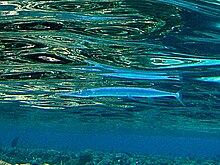
The tentacled flathead, also known as the Indian Ocean crocodilefish, Madagascar flathead or longhead flathead, is a species of marine ray-finned fish belonging to the family Platycephalidae, the flatheads. This species is in the western Indian Ocean, including the Red Sea and the Mediterranean, having invaded as a Lessepsian migrant through the Suez Canal. It is the only species in the monotypic genus Papilloculiceps.

The doctorfish tang, also known as the doctorfish, is a species of marine ray-finned fish belonging to the family Acanthuridae, the surgeonfishes, unicornfishes and tangs. These fishes are found in the western Atlantic Ocean.
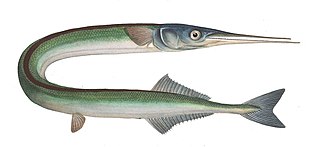
Belone is a genus of needlefish common in brackish and marine waters. It is one of ten genera in the family Belonidae.

Chrysiptera hemicyanea, known commonly as the azure damselfish, azure demoiselle, half-blue demoiselle, and yellow-dipped damsel, is a species of damselfish.

Pomacanthus maculosus, the yellowbar angelfish, half-moon angelfish, yellow-marked angelfish, yellowband angelfish or yellow-blotched angelfish, is a species of marine ray-finned fish, a marine angelfish belonging to the family Pomacanthidae. It is found in the western Indian Ocean and, more recently, in the eastern Mediterranean Sea.
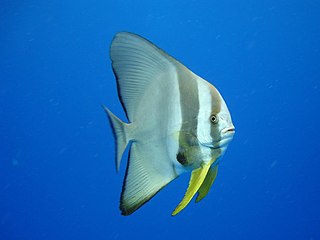
Platax teira, also known as the teira batfish, longfin batfish, longfin spadefish, or round faced batfish is a species of marine ray-finned fish belonging to the family Ephippidae, the spadefishes and batfishes. This species is found in the Indo-West Pacific.
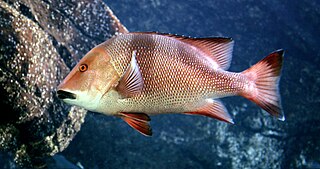
Lutjanus sebae, also known as red emperor, emperor red snapper, emperor snapper, government bream, king snapper, queenfish or red kelp, is a species of marine ray-finned fish, a snapper belonging to the family Lutjanidae. It is native to the Indian Ocean and the western Pacific Ocean.

Tylosurus is a genus of needlefish, one of ten in the family Belonidae. They are found worldwide in tropical and warmer temperate seas and two species have been recorded as Lessepsian migrants in the eastern Mediterranean Sea.
The short-beaked garfish is an uncommon species of needlefish in marine waters of the eastern Atlantic Ocean. This pelagic needlefish is present off the coasts of Ireland, Spain, Portugal, and the United Kingdom, and possibly in the Mediterranean Sea, as well. This species was thought to be the same as the garfish because they share the same waters. The short-beaked garfish matures at 30 cm (12 in) and can grow to a maximum of 65 cm (26 in) while Belone belone can be 95 cm (38 in). Like all needlefish, this one has an elongated body with beak-like jaws that are lined with razor sharp teeth. The short-beaked garfish's lower jaw is longer than the upper. Its body is silvery like most needlefish and has a black stripe running across its lateral line. The dorsal and anal fins are very close to the caudal peduncle. These fish are oviparous. Eggs may be found attached to objects in the water by tendrils on the egg's surface. These spherical eggs are dispersed on the sea floor (demersal). Not much is known about this fish's feeding habits. It likely preys on small oceangoing fish. It has been caught using mackerel. Needlefish tend to be surface fish, so are preyed upon like Atlantic mackerel, European pilchard, sand smelt, etc. The specific name honours Anatolii Nikolaevich Svetovidov (1903-1985) who was an ichthyologist at the Zoological Institute in Saint Petersburg, Russia and a colleague of N.V. Parin.

The dwarf flathead is a species of marine ray-finned fish belonging to the family Platycephalidae, the flatheads. It is found in the Indo-Pacific. It is the only species in the monotypic genus Elates.

The mottled fusilier is a species of marine ray-finned fish, a fusilier belonging to the family Caesionidae. It has a broad Indo-Pacific distribution. It is the only species in the monotypic genus Dipterygonotus.
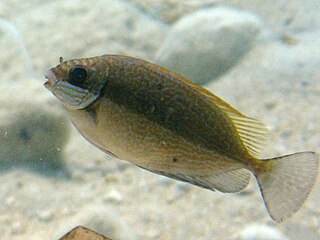
The dusky spinefoot, also known the squaretail rabbitfish,is a species of marine ray-finned fish, a rabbitfish belonging to the family Siganidae. It is native to the western Indian Ocean which has spread to the Mediterranean Sea through the Suez Canal. Its fin spines contain venom. It is regarded as a food fish.

Caesio varilineata, the variable-lined fusilier or thin-lined fusilier, is a species of pelagic marine ray-finned fish, a fusilier belonging to the family Caesionidae. It is found in the Indo-Pacific region.

Vanderhorstia mertensi, Mertens' shrimp goby or the slender shrimp goby, is a ray-finned fish species native to the Red Sea, Japan, Papua-New Guinea and the Great Barrier Reef. Male individuals can reach a length of 11 cm in total. In 2008 a first specimen was collected in the Mediterranean Sea, in the Gulf of Fethiye, southern Turkey, where it was found on sandy bottoms in the vicinity of beds of sea grass. It is now common in Israel, Turkey and Greece. According to the Mediterranean Science Commission this species most likely entered the Mediterranean via the Suez Canal from the Red Sea.
The specific name honours the German herpetologist Robert Mertens (1894-1975), the former director of the Naturmuseum Senckenberg in Frankfurt, from whom the author, Klausewitz, learnt about the biological and ecological view of modern systematics and taxonomy.
Equulites klunzingeri, or Klunzinger's ponyfish, is a marine, demersal species of ponyfish from the family Leiognathidae which was originally found only in the Red Sea. It is colonizing the Mediterranean as part of the Lessepsian migration through the Suez Canal.

Parupeneus forsskali, common name Red Sea goatfish, is a species of goatfish belonging to the family Mullidae.
Oxyurichthys petersii, commonly known as Peters' goby, is a species of ray-finned fish, a goby, from the family Oxudercidae. It is native to the Red Sea, and has now colonised the eastern Mediterranean Sea by Lessepsian migration through the Suez Canal.

Upeneus pori is a species of marine ray-finned fish, a goatfish from the family Mullidae which is found in western Indian Ocean and the eastern Mediterranean Sea.
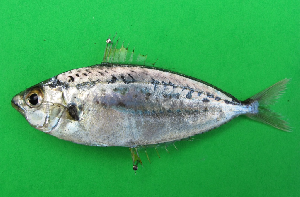
Equulites popei, Pope's ponyfish, is a species of marine ray-finned fish, a ponyfish from the family Leiognathidae. It has a wide Indo-Pacific distribution which extends from the Red Sea east to the western Pacific Ocean. It has entered the Mediterranean as a Lessepsian migrant. It was formerly considered to be synonymous with the elongate ponyfish.

The halfspined flathead is a species of marine ray-finned fish belonging to the family Platycephalidae, the flatheads. This species is found in the western Indian Ocean and the Red Sea.
